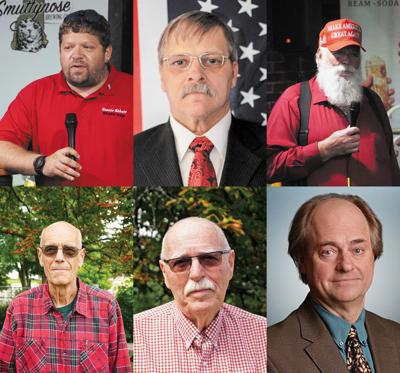Six Republican candidates are running for the four open spots in the sixth district of the Statehouse of Representatives, which represents Gilford, Gilmanton and Laconia’s second ward.
The four top vote-getters in the Tuesday, Sept. 10 Primary Election will then face four Democrats vying for the seats in the General Election on Tuesday, Nov. 5.
Ronnie Abbott is one of the candidates running for state representative in Belknap County District 6. Before a crowd of voters at Paugus Bay Pub on Aug. 28, he said he’s a political newcomer and can reach voters who may not generally be engaged in politics.
“I’m new to this whole thing, it’s my first time doing all of this,” Abbott said. “I’m a father of three, a small business owner. I got into politics originally because I’m a photographer and I would go to all of these events and I would take pictures. I was watching what was going on and I kept seeing areas where I thought, ‘I could help out here.'”
Noting two of his core issues are the preservation of the Second Amendment and the tradition of free speech protections, Abbott said he brings a unique perspective to state politics.
“The big thing I think I can help with is reaching a different category of person,” Abbott said. “There’s a lot of people that I grew up with who would never walk into a room like this. And I think the ability to be able to reach out to people like that is going to give me a different aspect of seeing the houseless epidemic, the drug issues.”
Rep. Harry Bean, current chair of Belknap County Delegation, said at the recent "meet the candidates" event at Paugus Bay Pub that he is seeking a fourth term, and he generally agrees with the opinions of Tom Ploszaj, a candidate for state representative in Center Harbor and New Hampton's District 1.
"I'm in my third term, running for a fourth term. I've been the chair for a couple of years now thanks to the 17 others who voted me in," Bean said. "I'm for all of the same things, just like Tom said."
Ploszaj told voters he is always available to speak with constituents and encouraged people in the public to contact him regarding major and minor concerns, noting he can't reasonably represent the district unless voters provide him input.
"I'm running again, if anybody's interested in voting for me I'd appreciate that," Bean said.
According to a profile compiled by Citizens for Belknap, Bean expresses his concern that military veterans receive just care, that every citizen's right to vote should be protected and that illegal immigration into the United states should be curtailed.
Bean noted his involvement in the reopening of Gunstock Mountain Resort in 2022, and said he places a strong emphasis on legislating in accordance with the U.S. Constitution.
Glen Aldrich, who served in the state Legislature for four terms ending in 2022, is hoping voters will send him back for a fifth.
Aldrich, who spent his working years as a builder and now lives on Social Security disability, said he was motivated to get involved with politics because he noticed his taxes were going in only one direction: up. Rising taxes caused him and his wife to sell their home in New Jersey and move to New Hampshire, and now he’s seeing similar patterns here.
“Three years ago my taxes were $300, last year they were $311, and this year they’re nearly $1,000,” he said. He lives in a manufactured home park in Gilford, and he said the rise in taxes had more to do with his property assessment than with municipal spending, but still he felt there “ought to be a law” against doubling a resident’s property taxes in one year. “I think that’s absolutely crazy.”
Aldrich said he’s proud of his voting record during his time in the Legislature, and felt he was unfairly villainized, along with former Belknap County Delegation Chair Mike Sylvia, who Aldrich called a “good Republican,” for their opposition to the way county-owned Gunstock Mountain Resort was being run.
“It’s a shame, because I lost friends because they bought into the nonsense that they said,” Aldrich said. “I think I did a good job.”
Aldrich said he supports the legalization of recreational cannabis, and he characterizes himself as a “Rand or Ron Paul conservative. I have some Libertarian tendencies.” Some have called him a “Free Stater,” to which he replied, “I was born and raised in New Jersey, so a free state sounds pretty good to me.”
If given a seat again in the Legislature, Aldrich said he would be “pro gun” and “low taxes.” He said he figures most Americans pay around half of their earnings to taxation, in one form or another. “That’s nuts, that’s slavery,” he said.
Richard Beaudoin, of Laconia, is hoping to earn a second term in office. He is finishing his first, which was his first electoral victory after nearly two decades of running.
“I’ve run for public office since 2005,” Beaudoin said, noting his first campaigns were for Laconia City Council. He started running for the Legislature, he said, to try to “straighten out the mess in Concord. .. If it’s a Democrat bill, Republicans vote against it. If it’s a Republican bill, Democrats vote against it.” And most bills are what he calls “repeats,” legislation which had previously failed. “Let’s change a little bit of wording and try to shove it through again.”
Beaudoin said he’s against legalizing recreational cannabis — “We’ve got enough of a problem with drunk drivers, we don’t need pot,” he said. He supports the “Parental Bill of Rights,” which would compel teachers to tell parents when students ask to be referred to by a name or pronoun that indicates a different gender.
“I think it’s time for open communication between parents and teachers,” Beaudoin said. Other than that, he said he would consider each vote as it comes. “If I see a bill that I believe is going to benefit people, I’ll vote for it. If it’s not going to benefit people, I’ll vote against it.”
Russell Dumais, of Gilford, is running for his third term in the Legislature. In addition to his time in Concord, “I sat on about every board and commission in Gilford," he said.
Dumais said he got into politics to, “Do the right thing. That means low taxes, small government, and leave the people alone.” He said he’s more “common sense” than dogmatic, and pointed to his role in subverting the efforts of then-Reps. Norm Silber and Sylvia to disrupt the operations of Gunstock Mountain Resort in 2021.
“They were attempting to disenfranchise people of Gunstock under the guise that it shouldn’t be owned by government,” Dumais said. He happens to sympathize with that philosophy, but said he disagreed with their tactics. “What we have is Gunstock that’s been around since the ‘30s. Tom [Day, former general manager] and his crew over there were doing a great job, it ought to stay the way it is because it’s grown into the fabric of the community.
"If it isn’t broken, don’t fix it.”
Dumais said he’s willing to listen to the need for any new program, but wants to avoid increasing the burden on taxpayers. “I am on the taxpayer’s side,” he said. “There has to be a way to pay for it. 'What are we currently doing that we can do away with to fund the new project?' That’s my philosophy. Keep the government as small as can be, keep the hand of government out of your pocket.”
Dumais said he has lived in Gilford for “fifty-some-odd years. It’s a great community, Belknap County’s a great county. We can’t dilute who we are,” referring to the practice of people moving in from out of state, and bringing their expectations of services with them. “I’m saying what we have is what we’ve got, if we want to do something, what are we going to do away with ... so there’s no net increase?”
David Nagel, a Gilmanton resident and physician by training, said he first became engaged with politics about 37 years ago. “I ended up working with a very young Jeb Bradley and an even younger me,” he said, referring to a time when he helped the then-state representative craft legislation to permit non-physicians to practice acupuncture in New Hampshire. He continued his involvement as an advocate, writing a book and speaking to many industry and advocacy groups both near and far, and finally decided to run for office two years ago so he could be in a position to make the changes he was urging were needed.
He said people are mostly aware of mental health and substance misuse crises, but he said there are “a lot of other health care crises that people don’t even know about.” In particular, he is concerned about the crisis of accessibility of health care, noting about half of all Americans are not sufficiently insured.
Nagel signed on to more than a dozen pieces of legislation in his first term, and the one he’s most proud of is Senate Bill 561, which sought to reduce the barrier of prior authorization. He takes pride in that legislation not only because of what it does, but how he went about it.
“I put more than 100 hours into that bill,” Nagel said. “I was told over and over again that I was wasting my time,” but he succeeded by building a coalition of stakeholders that included care providers as well as insurers and the state insurance commissioner. Not only were they able to find a solution that worked for all parties, “the biggest thing we did was we created a group of people who can talk to each other and take the next steps,” he said, referring to his desire to continue finding ways to improve access to care. “That’s why I need to get back to the state Legislature.”
Nagel considers himself a “moderate Republican.” He wants to improve access to care for all, and specifically for Native Americans and for women with high-risk pregnancies. He is concerned about the increasing role corporate influences play in exam rooms, wants “responsible medical cannabis policy,” and “responsible drug harm reduction policies,” among other policy objectives, according to his website.
Though he sees himself as representing a majority of Republican voters, he said he feels like a minority in Concord, where he sometimes is smeared as a “Republican in name only.”
“I get called a ‘RINO’ because I challenge the establishment a lot, but somebody’s got to do it,” he said, calling for a greater allowance of diversity within his own party, and for an openness to bipartisan solutions. “It’s not a black/white thing, it’s a diversity of opinion,” he said. “How do we bring people together with different opinions?
"I’m a moderate Republican, I feel my type of people are the majority of the party, but we’re ostracized.”


















(0) comments
Welcome to the discussion.
Log In
Keep it Clean. Please avoid obscene, vulgar, lewd, racist or sexually-oriented language.
PLEASE TURN OFF YOUR CAPS LOCK.
Don't Threaten. Threats of harming another person will not be tolerated.
Be Truthful. Don't knowingly lie about anyone or anything.
Be Nice. No racism, sexism or any sort of -ism that is degrading to another person.
Be Proactive. Use the 'Report' link on each comment to let us know of abusive posts.
Share with Us. We'd love to hear eyewitness accounts, the history behind an article.